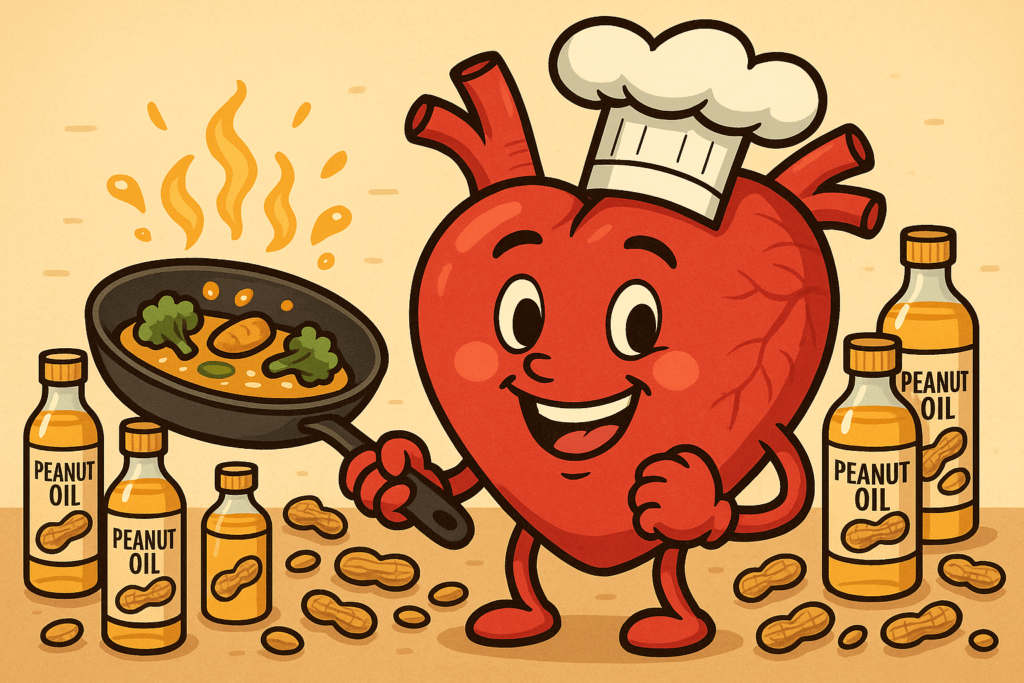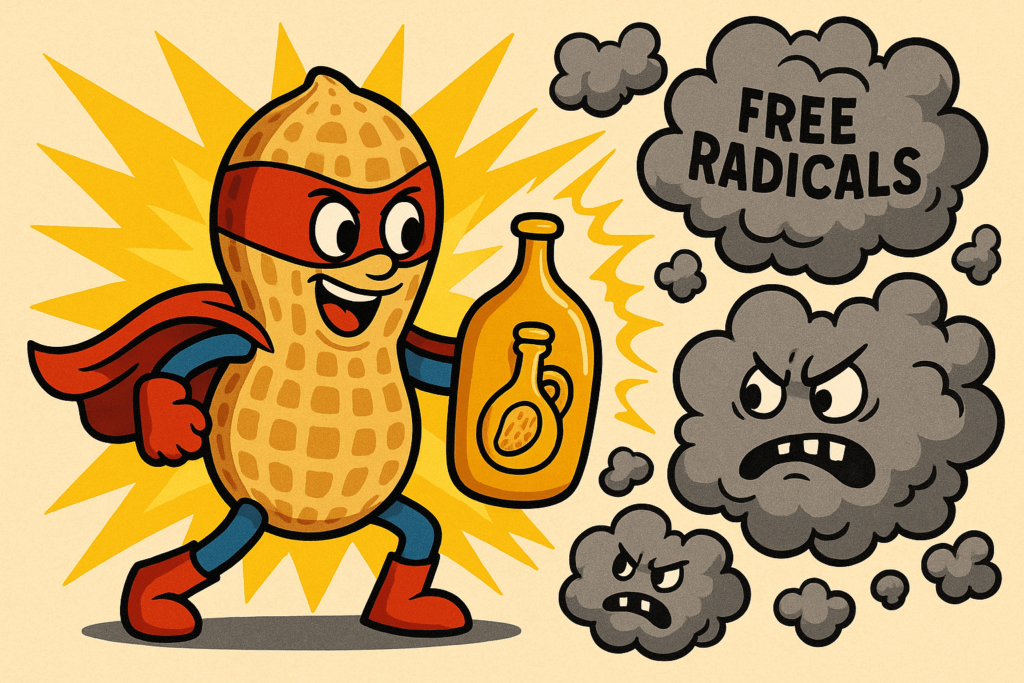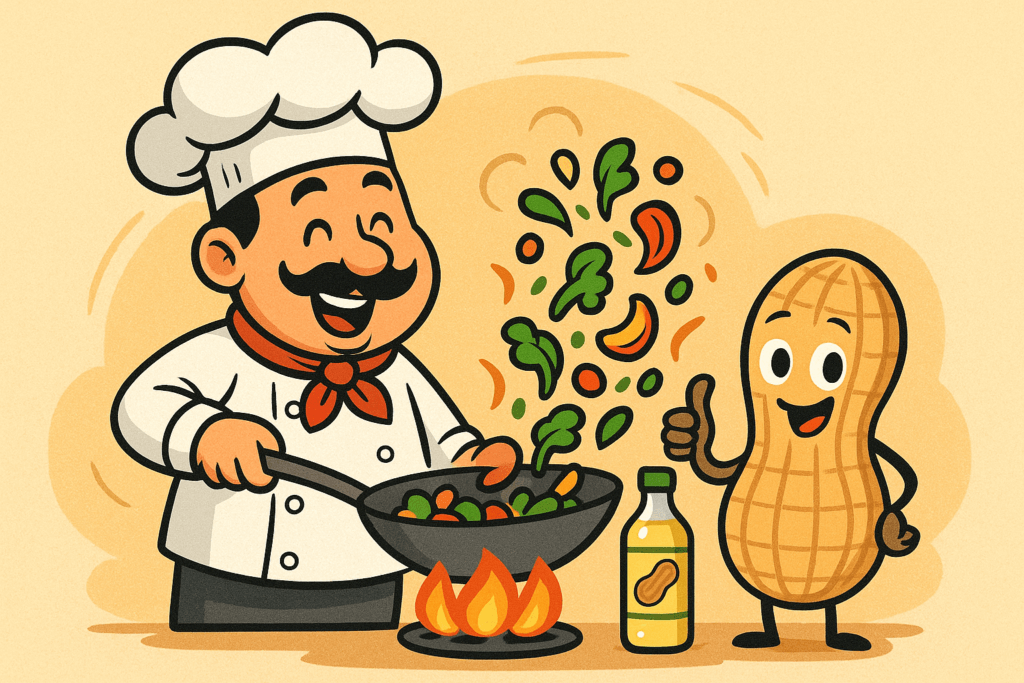When you start cooking with peanut oil, it’s like inviting a silent partner into your kitchen—one that not only adds flavor but also takes care of your health in many ways. From heart protection to better digestion, from supporting weight balance to controlling blood sugar, peanut oil has far more to offer than we usually realize. Let’s dive deeper into why this oil deserves a place in your pantry.
Why cooking with peanut oil can be heart-friendly
One of the strongest reasons people switch to cooking with peanut oil is its heart-friendly nature. Unlike oils that are heavy in saturated fats, peanut oil is loaded with unsaturated fats, particularly oleic acid, which is known to be beneficial for cardiovascular health. When you cook your meals with this oil, you’re giving your body fats that support good cholesterol (HDL) while lowering bad cholesterol (LDL).
Regular use of peanut oil in moderation can reduce the risk of clogged arteries, heart attacks, and strokes. It also contains compounds called phytosterols, which further help block cholesterol absorption in the gut. Think of them as natural defenders that keep harmful cholesterol from piling up in your bloodstream.

On top of that, peanut oil is a natural source of vitamin E, a powerful antioxidant. Vitamin E not only protects the heart but also prevents the oxidation of LDL cholesterol, which is one of the main reasons behind arterial damage. So, when you’re cooking with peanut oil, you’re not just frying or sautéing—you’re giving your heart a better chance to stay strong and healthy.
Anti-inflammatory and antioxidant advantages
Another reason to enjoy cooking with peanut oil is its ability to fight inflammation and free radicals. Free radicals are unstable molecules that can damage cells, accelerate aging, and trigger many chronic diseases. Antioxidants are the natural warriors that neutralize these harmful molecules, and peanut oil is rich in them.
Vitamin E in peanut oil shields your cells, making your body less prone to oxidative stress. Over time, oxidative stress is linked to everything from wrinkles to cancer. Using peanut oil in your cooking is like adding an invisible shield that protects your body at a cellular level.
Moreover, the anti-inflammatory properties of peanut oil make it especially useful for people who deal with joint stiffness, muscle pain, or inflammatory conditions. Adding it regularly to your cooking can help reduce inflammation naturally and gently, without the side effects of harsh medicines.
So every time you drizzle or fry with peanut oil, you’re quietly helping your body stay younger, stronger, and more resilient.
Cooking with peanut oil and weight management
At first glance, using oil might feel like the enemy of weight management. But here’s the twist: not all fats are equal. The healthy fats in peanut oil can actually support weight balance when used in moderation. Unlike saturated fats that pile up in the body, the unsaturated fats in peanut oil are more efficiently burned for energy.
Diets rich in oleic acid, the main fat in peanut oil, have been linked with improved metabolism and reduced chances of obesity. This means that cooking with peanut oil can give your body the kind of fats that keep your metabolism active and steady. When your metabolism works properly, it’s easier to maintain or even lose weight.

Peanut oil also helps you feel fuller for longer. That means less snacking and fewer cravings after meals. Over time, this simple shift can make a big difference in managing calories and controlling weight. It’s one of those quiet helpers that makes weight management easier without making you feel deprived.
Cooking with peanut oil and blood sugar control
If you or someone in your family worries about blood sugar levels, here’s another reason to consider cooking with peanut oil. The unsaturated fats in this oil play a role in keeping blood sugar steady. They improve how your cells respond to insulin, the hormone responsible for controlling blood sugar.
When you replace unhealthy saturated fats with peanut oil in your meals, you’re essentially making it easier for your body to manage glucose. For people with diabetes or pre-diabetes, this shift can be especially meaningful. Balanced fats like those in peanut oil reduce sugar spikes after meals and support overall glycemic control.
This doesn’t mean peanut oil is a cure, but it does mean it can be part of a lifestyle that helps your body stay balanced. Whether you’re stir-frying vegetables or shallow-frying chicken, peanut oil can be an ally for your blood sugar health.
Digital fatigue symptoms – Science Behind the Strain
Cooking with peanut oil and digestive health
Gut health is one of the most overlooked aspects of overall wellness, yet it affects everything from immunity to mood. Interestingly, cooking with peanut oil can indirectly support a healthy gut. The fats in this oil encourage the growth of beneficial gut bacteria, the “good guys” that help break down food and absorb nutrients.
These friendly microbes produce short-chain fatty acids, which nourish the lining of your intestines, reduce inflammation, and improve digestion. By using peanut oil in your regular meals, you help maintain a gut environment that supports not only digestion but also mental clarity and immune strength.
Good digestion means less bloating, better nutrient absorption, and even more energy. Imagine your gut as a garden—peanut oil helps provide the fertile soil where beneficial bacteria can thrive.
Versatility and safety in cooking
Apart from health, one of the most practical reasons to use cooking with peanut oil is its high smoke point. The smoke point is the temperature at which oil starts to break down and release harmful compounds. Peanut oil has a high smoke point—about 450 °F (232 °C)—making it perfect for frying, sautéing, and stir-frying without the risk of turning toxic.
This means you can cook crispy fries, crunchy tempura, or flavorful stir-fried veggies without worrying about the oil degrading. Unlike some oils that smoke quickly and lose their nutrients, peanut oil remains stable, ensuring that your meals are both tasty and safe.
However, one important consideration is peanut allergies. Highly refined peanut oil often has proteins removed, making it safe for many, but unrefined or cold-pressed peanut oils may still trigger allergic reactions. If you or someone in your family has a peanut allergy, it’s wise to check the type of oil you’re using.

All in all, cooking with peanut oil is not only healthy but also versatile and practical. It gives you freedom in the kitchen while ensuring that health remains a priority.
Cooking with peanut oil and skin & hair health
An often overlooked benefit of cooking with peanut oil is how it contributes to your external health—your skin and hair. Because peanut oil is rich in vitamin E and antioxidants, it helps nourish skin cells from within. Over time, this translates into healthier, glowing skin.
The oil also supports the production of collagen, the protein responsible for skin elasticity. Regular intake can help slow down the appearance of fine lines and wrinkles. Meanwhile, the healthy fats help maintain hydration, keeping the skin soft and supple.
For hair, peanut oil’s nutrient profile strengthens follicles, reduces dryness, and can even add natural shine. While people often apply peanut oil topically, even including it in your diet makes a difference because healthy hair always starts with proper internal nutrition.
Is peanut oil good for your heart?
Yes, peanut oil contains healthy fats and antioxidants that support cardiovascular health by lowering LDL cholesterol and protecting arteries.
Can peanut oil help manage blood sugar?
Yes, replacing saturated fats with peanut oil can improve how the body responds to insulin and help manage blood sugar levels.
Is peanut oil safe for high-heat cooking?
Absolutely. With its high smoke point, peanut oil is great for frying, sautéing, and stir-frying without producing harmful compounds.
Does peanut oil cause inflammation?
No, the balanced fats in peanut oil are actually anti-inflammatory and may reduce risks of inflammation-related issues.
Is peanut oil safe for people with peanut allergies?
Highly refined peanut oil is often safe, but unrefined or cold-pressed varieties can trigger allergies. Always check labels and consult your doctor if unsure.
